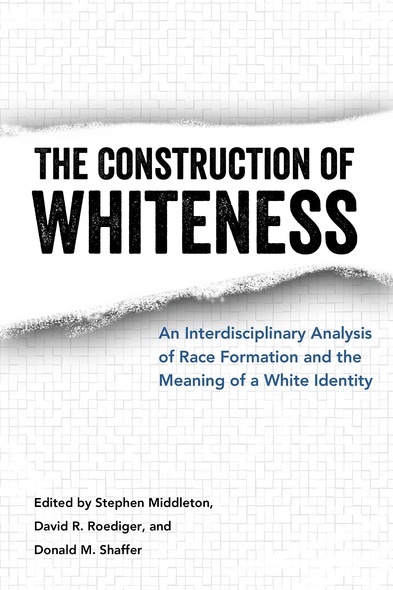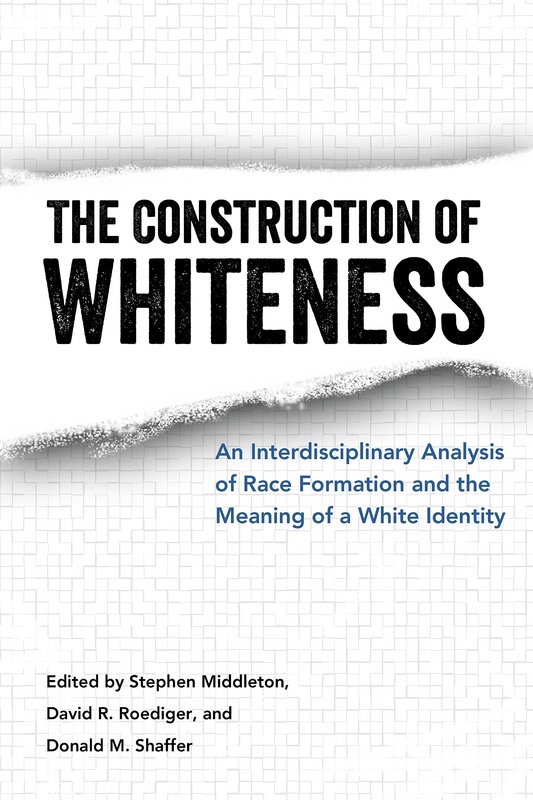Our shopping cart is currently down. To place an order, please contact our distributor, UTP Distribution, directly at utpbooks@utpress.utoronto.ca.

The Construction of Whiteness
An Interdisciplinary Analysis of Race Formation and the Meaning of a White Identity
A CHOICE Outstanding Academic Title, 2017
This volume collects interdisciplinary essays that examine the crucial intersection between whiteness as a privileged racial category and the various material practices (social, cultural, political, and economic) that undergird white ideological influence in America. In truth, the need to examine whiteness as a problem has rarely been grasped outside academic circles. The ubiquity of whiteness—its pervasive quality as an ideal that is at once omnipresent and invisible—makes it the very epitome of the mainstream in America. And yet the undeniable relationship between whiteness and inequality in this country necessitates a thorough interrogation of its formation, its representation, and its reproduction. Essays here seek to do just that work. Editors and contributors interrogate whiteness as a social construct, revealing the underpinnings of narratives that foster white skin as an ideal of beauty, intelligence, and power.
Contributors examine whiteness from several disciplinary perspectives, including history, communication, law, sociology, and literature. Its breadth and depth makes The Construction of Whiteness a refined introduction to the critical study of race for a new generation of scholars, undergraduates, and graduate students. Moreover, the interdisciplinary approach of the collection will appeal to scholars in African and African American studies, ethnic studies, cultural studies, legal studies, and more. This collection delivers an important contribution to the field of whiteness studies in its multifaceted impact on American history and culture.
The development of studies of ‘whiteness’ has reshaped how scholars think about race and class. Adding to an intriguing and challenging field of study, this volume of essays presents the major recent scholarship on the ideology of racial identity in American history. With brilliance and great perception, this collection provides a multidisciplinary approach (history, English, law, communication, sociology, and more) that broadens the focus beyond a mere commentary on generalized culture and legalities. Grappling with forces and factors affecting the creation and meaning of whiteness, this in-depth examination uncovers the deeply intertwined relationship between racial identity and politics. The surprising juxtaposition of ideas pulls the reader into an emotional landscape that covers over 200 years of US History. These are sweeping ideas, bracing and challenging. They mercilessly expose the complexity and tension endemic in racial identity.
Concentrating on the conjunctures of whiteness in the United States and committed to an interdisciplinary and intersectional approach, the essays of this volume analyze the development of whiteness in profound studies. In impressive investigations based on a comprehensive evaluation of primary sources, the papers exemplify the socio-cultural, socio-economic, and socio-political construction of whiteness. They elucidate that blackness and whiteness are contested categories, which not only indicate antagonisms but also frequently overlap and combine with movements of emancipation against sexism, classism, racism, ableism and other mechanisms of exclusion. In doing so, the editors of The Construction of Whiteness have compiled a groundbreaking collection, demonstrating the necessity and productivity of a historically orientated analysis of whiteness.
Stephen Middleton is Emeritus Professor of History at Mississippi State University. He is author of The Black Laws: Race and the Legal Process in Ohio, 1787-1860. David R. Roediger is foundation professor of American studies and history at University of Kansas. He is author of Seizing Freedom: Slave Emancipation and Liberty for All. Donald M. Shaffer is director of the African American Studies Program as well as mentor to Presidential Scholars and associate professor of English at Mississippi State University. His work has appeared in the Southern Literary Journal and Western Journal of Black Studies.




